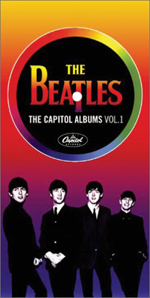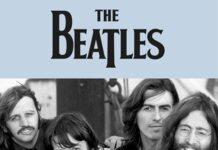I admit I was a slightly disconcerted in 1987 when the Beatles rolled out their precious catalog on compact disc, and they decided to release the British versions instead of the American versions. After all, I was weaned on Meet The Beatles and Something New, not With The Beatles and Beatles For Sale. On the other hand, being the purist that I am, I could also appreciate that the 1987 CDs represented the titling, packaging and song selections of the Beatles themselves, not the executives at Capitol. But hey, as long as the songs are intact, that’s all that matters, right? Apparently not. In a final stroke of the Beatle’s 40th Anniversary in America marketing savvy, Capitol has boxed up the first four American albums from 1964 and tagged it The Capitol Albums Volume 1 — meaning, of course, there must be more to follow. While a few by-the-book diehards will undoubtedly cry wolf, Capitol is hedging its bets that a huge constituency of Beatle fans will snatch this box up like a long-lost chum. When you throw in the nifty, economical packaging with the recreated original sleeves, both remastered duophonic stereo and mono versions of each and every song, and a 48-page booklet, it’s simply too much to resist.
At the heart of The Capitol Albums Volume 1 are 45 Lennon-McCartney originals that set the stage for the greatest rock and roll band of all time (for all you confused Rolling Stone readers, “all time” means past, present, and future). Simple, concise and exuberant, the Beatles’ early music struck a powerful chord throughout the world. Americans in particular, who, in 1964, were still mourning the loss of JFK, went bonkers for the shaggy-haired foursome from Liverpool. Meet The Beatles, The Beatles’ Second Album, Something New, and Beatles ’65 seemingly resuscitated America’s spirit, each becoming multi-platinum, Top Ten albums (three Number Ones and one Number 2), boasting over a dozen singles, including “I Want To Hold Your Hand,” “She Loves You” and “She’s A Woman” — all in a single year! Criticism of Capitol’s simulated stereo processing, fewer tunes than their British counterparts, competition from other labels, and Dave Dexter’s twist on sequencing would eventually come under fire. But when it comes right down to it, the no-fuss, average fan can do without the trivialities. Clearly, the Beatles and Apple Corp., whose famous logo adorns the CDs and much of the restored artwork, have no objections. So one has to ask: why should anyone else?
~ Shawn Perry




















